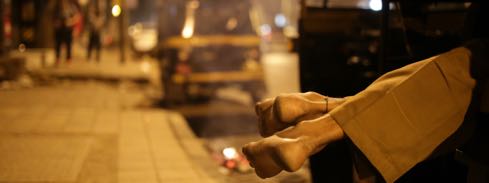Mumbai, 13-19 February. I joined a Deleuze camp and conference at the Tata Institute for Social Sciences.
Photo by Zach Horton
Camp session: The contemporary imperative of creativity and possible lines of flight
The imperative to be/come creative increasingly permeates contemporary life. Especially young people are encouraged to look for jobs that are creative, that promise freedom, and that allow for an expression of the true self. The new creative workforce that is hence emerging is as flexible as it is precarious. With creativity turned into a competitive asset, we witness today a competition, the more creative a person, a city, a district, a country is, the better. Creativity thus serves as a force that regulates, disciplines and steers, it can be read as yet another intensification of biopolitical power. In this camp session we will engage with this emerging imperative, or dispostif, of creativity, and the demands and pressures it imposes on especially global youth today. After a critical Foucauldian diagnosis of this dispositif, one that we will also translate towards our own biographies, we will turn to Deleuze and his ideas of lines of flight and micropolitics. How can we find lines of flight outside of the overcoded language of creativity? Acknowledging that there is no outside to the system of what can opaquely, and highly problematically, be termed global capitalism or global neoliberalism, are there ways for us to tweek and twist our personal biographies, explore a micropolitics that mutates this notion of creativity, that allows for failure, for being not creative? Can we discover more provocative translations of the term into terrains that do not aim to turn creativity into capital, but that pay attention to, for example, craftsmanship, to collaborative creativities, or to a creative commoning that may produce what can be termed a rhizomic publicness in which the creative self is skillfully circumvented.
Conference paper: It smells like creativity: What if Kurt Cobain comes to China to rescue us?
With its emergence as a global power, China aspires to move from a “made in China” towards a “created in China” country (Keane 2011). Creativity and culture have become a crucial source for innovation and financial growth, but are also mobilised to promote a new and open China to both the citizenry as well as the outside world. They are part of what is termed China’s “soft power” (Nye 2004). The words of Chinese president Hu Jintao in 2008 are telling in this respect, he claims, “[We must] enhance culture as part of the soft power of our country to better guarantee the people’s basic cultural rights and interests. A nation cannot stand among great powers without its people’s spiritual affluence and the nation’s full expression of its creativity.” (in Keane 2009: 221)
In my paper I will, first, probe into the appropriation of the notion of creativity and soft power in the context of China. The overcoded language of creativity, innovation and sustainability, I will argue, are part of a governmental logic in which not only the Chinese state but also the global cultural industries are complicit. While this move towards creativity can be read as a consequence of the globalisation, after all, also London, Amsterdam and Mumbai aspire to become ever more creative, I will show how globalisation also allows for the infiltration of other counter-narratives. Taking my inspiration from the arrival of Kurt Cobain in 2011 in Beijing on a flying saucer, in the movie Follow Follow from Peng Lei, I aim to look for such counter-narratives or, better, lines of flight away from the global discourse of creativity. Cobain left China in that movie, the country did not fit him, he claimed. He was wrong. As I will show, using examples from cinema, music, contemporary art and fake art, maybe less his temporary visit in 2011, that sadly remained by and large hidden from the public, but for sure his oeuvre and death, has had a lasting impact.
This significance becomes particularly apparent when we probe deeper into the issue of copying. In the movie, vocalist Peng Lei sings in the refrain of the title song of the movie, “we don’t want to copy you, we don’t want to become like you,” but all examples in the song – “we don’t sing karaoke, we don’t go on the Internet” indicate that he is joking. The song’s refrain is therefore better to be read as: We do want to copy! And, indeed, through the omnipresent act of copying, it starts to smell like creativity in the urban centres of China. This smell allows for a contamination of that same notion of creativity, it allows for a micropolitics that undermines the overcoded language of creativity, and instead may uncover the dirt that lies beneath the shiny surface of that thing called “Chinese culture.”
